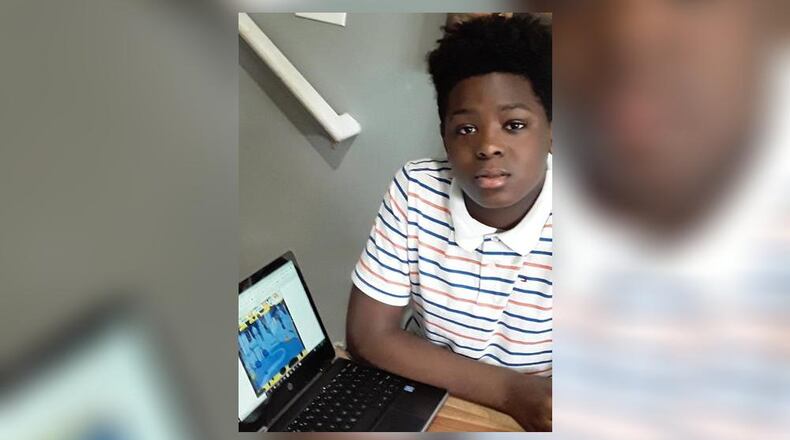Just as the COVID-19 pandemic was taking hold of the country, Israel Smith was tasked with designing a game that somehow mirrored a current event.
There was, of course, a lot of talk about the coronavirus back in March, but the 12-year-old hadn’t yet been touched by it.
If fellow classmates at Brookhaven Innovation Academy Charter School saw the virus as something to fear, Israel viewed it as just another menace to, in his words, “move past.”
It’s how he deals with most things, he said.
“I try to move past it.”
But as he contemplated what world issue he could bring to gaming, Israel realized COVID-19 was definitely the formidable foe he needed.
Just as he was starting, news came in April that an uncle had passed in New York. The cause of death was the coronavirus, the engine that would power Israel forward.
RELATED | Why COVID-19 is hitting African Americans especially hard
When his school was forced to transition to digital learning because of the virus and he could no longer reach his class partner, Israel had to start over from scratch, applying the coding skills he’d learned at school in partnership with a nonprofit called Mouse.
Credit: The Atlanta Journal-Constitution
Credit: The Atlanta Journal-Constitution
Mouse, you may or may not recall, is a nonprofit founded by social entrepreneurs Andrew Rasiej and Sarah Holloway of New York. For 20 years now, Mouse has committed itself to helping vulnerable youths, especially black and Latinx students, explore tech careers and learn new skills at school and at home, said CEO Larry Lieberman.
That includes providing engaging computer science programs and curriculum so students like Israel can express themselves creatively using technology.
As COVID-19 continued its spread across the country, Mouse employees quickly retooled the program to help teachers mentor and counsel students like Israel, conducting online lessons using Google Classroom and Google Drive, two platforms that many students and teachers have never employed.
Over the next few weeks, Israel worked feverishly to create a Coronavirus Re-Mix Space Impact game.
He describes it as a simple, arcade-style game, in which players get 30 seconds to locate and kill the coronavirus with a laser. For every virus you kill, you get 10 points.
RELATED | Teachers gain computer science savvy as kids apply skills to problems
To be sure, this isn’t just child’s play. Studies show that games like Israel’s are therapeutic for children facing trauma.
For instance, researchers found that young cancer patients who played Re-Mission 2, in which players get to blast cancer cells, had much better adherence to treatment schedules and a faster rate of self-efficacy than those who didn’t.
Israel, the youngest son of Jeannette Bloomfield and Harris Smith of Ellenwood, hopes his game will help children deal with their fear of COVID-19.
COMPLETE COVERAGE: Coronavirus
A few weeks ago, Israel learned that his Coronavirus Re-Mix game is a finalist in a student competition run by Mouse’s partner and national nonprofit Games for Change.
The results will be announced during a virtual ceremony June 17 in New York.
Friends, he said, have told him he’s lucky.
Israel is a little nervous, he said, but he hopes he’ll win.
I’d be surprised if he didn’t.
Find Gracie on Facebook (www.facebook.com/graciestaplesajc/) and Twitter (@GStaples_AJC) or email her at gstaples@ajc.com.
About the Author
Keep Reading
The Latest
Featured





